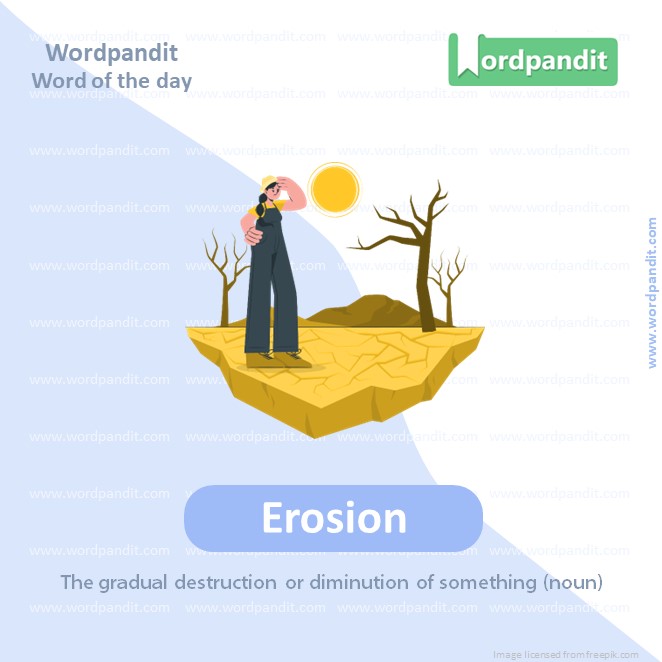Daily Vocabulary from Indian Newspapers and Publications
Welcome to Wordpandit’s Indian Vocabulary Hub
At Wordpandit, we understand the importance of staying rooted in the local context while expanding your language skills. This section focuses on enriching your vocabulary with words and phrases drawn from India’s leading newspapers and publications, ensuring you're learning vocabulary that is practical, relevant, and uniquely Indian.
Why Indian Sources Matter
We believe that the best way to master any language is by immersing yourself in local content. That’s why we carefully curate vocabulary from top Indian publications, including:
- The Hindu
- The Times of India
- The Economic Times
- Hindustan Times
- Live Mint
- The Indian Express
- And many others...
Stay Updated, Stay Relevant
With daily updates from Indian news sources, you’ll be consistently learning words that reflect the trends and shifts in Indian society and culture. Our focus is to provide vocabulary that enhances your understanding of the language in an Indian context.
How Wordpandit Supports Your Goals
Whether you’re preparing for exams, aiming to improve your professional communication, or simply want to stay connected with the latest Indian vocabulary, Wordpandit is here to guide you every step of the way.
Learn with a Practical Approach
Our interactive learning methodology includes real-world examples, engaging activities, and context-specific usage to ensure that every word becomes part of your active vocabulary.
Dive into Indian Vocabulary Today!
Why Choose Wordpandit?
Practical Learning: Focus on words you'll actually encounter in real-world reading, enhancing your comprehension and communication skills.
Diverse Content: From current affairs to scientific breakthroughs, our varied sources expose you to vocabulary across multiple domains.
Effortless Integration: Make Wordpandit a part of your daily routine. Just a few minutes each day can significantly boost your lexicon over time.
Your Path to Vocabulary Mastery
- Visit our Daily Vocabulary section regularly
- Explore new words and their usage in context
- Practice incorporating these words into your own writing and speech
- Track your progress as your vocabulary expands
Start Your Journey Today
Embark on your vocabulary enhancement journey with Wordpandit. By consistently engaging with our daily posts, you'll build a robust vocabulary that serves you well in academic, professional, and personal contexts.
Remember, a word a day keeps linguistic limitations at bay. Make Wordpandit your daily companion in the quest for vocabulary excellence!
WORD-1: Fervour
Context:
"But that fervour seems to have been missing for Bitcoin in particular and crypto in general during 2023." - Live Mint
Explanatory Paragraph:
Fervour refers to intense and passionate enthusiasm for something. When someone does something with fervour, they put their heart and soul into it, showing strong feelings and dedication. It is often used in the context of emotions, beliefs, or activities where people display deep commitment and energy.
Meaning: Intense and passionate enthusiasm (Noun)
Pronunciation: Fur-vur
Difficulty Level: ⭐⭐⭐ Intermediate
Etymology: From Old French *fervour*, from Latin *fervor* meaning "heat, boiling, passion."
Prashant Sir's Notes:
Common phrases associated with "fervour" that are frequently searched include **"religious fervour,"** **"patriotic fervour,"** and **"revolutionary fervour."** The word is often used to describe strong emotions in social, political, or religious contexts. For example, "The leader's speech ignited patriotic fervour among the crowd." Understanding these common uses can help in grasping the full impact of the word in different situations.
Synonyms & Antonyms:
Synonyms: Passion, zeal, enthusiasm, ardour, intensity
Antonyms: Apathy, indifference, lethargy, disinterest
Usage Examples:
- His **fervour** for environmental activism inspired many to take action.
- The soldiers fought with **fervour**, determined to protect their homeland.
- Despite the setbacks, she continued her research with undiminished **fervour**.
- The festival was celebrated with great **fervour**, bringing joy to the entire community.
Cultural Reference:
"Religious **fervour** has been a driving force behind many historical movements, from the Crusades to modern-day spiritual revivals." - History Channel
Think About It:
Can **fervour** be both positive and negative? When does enthusiasm turn into fanaticism?
Quick Activity:
Write a short paragraph describing a situation where you acted with **fervour**. It could be a speech, a competition, or a project you were deeply passionate about.
Memory Tip:
Think of **fervour** as "fire" in your heart—both words start with "F" and represent strong passion or intensity.
Real-World Application:
In marketing, companies often try to create **brand fervour** among customers, making them deeply enthusiastic about a product. Apple’s product launches, for instance, generate intense **consumer fervour** worldwide.
WORD-2: Solely
Context:
"Fifth, despite all the talk around the use cases of crypto, nothing substantial came out of it, and it turned out to be 'an asset whose value derives solely from greater fools' pricing it 'as high as the last idiot willing to buy it.' Of course, some greater fools continue to be around." - Live Mint
Explanatory Paragraph:
"Solely" means "only" or "exclusively." It is used to emphasize that something happens for one reason, by one person, or in one way, without involving anything else. The word often highlights restriction or limitation, indicating that no other factor or option is considered.
Meaning: Only, exclusively (Adverb)
Pronunciation: So-luh-lee
Difficulty Level: ⭐⭐ Beginner
Etymology: From Middle English *sole*, meaning "alone" or "single," derived from Latin *solus*, meaning "alone."
Prashant Sir's Notes:
Commonly searched phrases with "solely" include **"solely responsible,"** **"solely focused,"** and **"based solely on"**. These phrases are frequently used in legal, professional, and academic contexts. For example, "She is **solely responsible** for the project's success" or "Decisions should be made **solely based on** facts, not emotions." Understanding these common usages will help in applying the word correctly.
Synonyms & Antonyms:
Synonyms: Only, exclusively, entirely, completely
Antonyms: Partially, jointly, together, inclusively
Usage Examples:
- She was **solely responsible** for organizing the entire event.
- The company operates **solely** on renewable energy sources.
- His decision was based **solely** on financial factors, ignoring emotions.
- Success does not depend **solely** on intelligence; hard work matters too.
Cultural Reference:
"The U.S. Constitution states that power should not rest **solely** in the hands of one branch of government to prevent tyranny." - History Books
Think About It:
Can any decision truly be made **solely** on logic, or do emotions always play a role?
Quick Activity:
Fill in the blanks with "solely" or "only": 1. This job is _______ available to applicants with experience. 2. The responsibility of managing finances falls _______ on him.
Memory Tip:
Think of "solely" as connected to "solo"—when something is **solely** done, it is done **alone** or **exclusively**.
Real-World Application:
In business contracts, "solely responsible" is a critical phrase that defines legal accountability. For example, if an employee is **solely responsible** for financial decisions, they bear all risks and consequences alone.
WORD-3: Venture
Context:
"So, there is no real communication happening from the industry to egg on another round of greater fools, possibly because venture capitalist money that funded the industry might be running out or the industry might be playing it safe, given the government crackdown on its unregulated nature, including in China and India." - Live Mint
Explanatory Paragraph:
"Venture" can be used as both a noun and a verb. As a noun, it refers to a risky or daring business or journey, often involving uncertainty, such as a **business venture**. As a verb, it means to take a risk or go somewhere uncertain. It is frequently used in the business world, especially in the context of **venture capital**, where investors fund new and risky businesses with the hope of high returns.
Meaning: A risky or daring journey or business undertaking (Noun); To take a risk or dare to do something (Verb)
Pronunciation: Ven-chur
Difficulty Level: ⭐⭐⭐ Intermediate
Etymology: From Old French *aventure*, meaning "chance, risk," which evolved from Latin *adventura*, meaning "about to happen."
Prashant Sir's Notes:
Commonly searched phrases with "venture" include **"business venture,"** **"venture capital,"** and **"venture into"**. These terms are widely used in business and entrepreneurship. For example, "He started a new **business venture** in the tech industry" or "The company received **venture capital** funding to expand." Understanding these terms is essential for discussions related to startups and investments.
Synonyms & Antonyms:
Synonyms: Enterprise, undertaking, startup, gamble, endeavor
Antonyms: Security, certainty, safety, retreat
Usage Examples:
- She invested in a promising **business venture** in the renewable energy sector.
- The explorer decided to **venture** into the uncharted jungle despite the risks.
- Venture capital firms are always looking for innovative startups with high growth potential.
- He was hesitant to **venture into** the stock market without proper knowledge.
Cultural Reference:
"Silicon Valley is known for its strong **venture capital** ecosystem, which has helped launch some of the world's biggest tech companies, including Google and Facebook." - Business Insider
Think About It:
Do you think risk-taking is necessary for success, or should one always play it safe?
Quick Activity:
Think of a new **business venture** you would like to start. Write a short description of it and what risks it might involve.
Memory Tip:
Think of "venture" as an **adventure**—both involve taking risks and stepping into the unknown.
Real-World Application:
In the startup world, **venture capitalists** play a crucial role in funding innovative ideas. Many companies, like Uber and Airbnb, wouldn't have existed without **venture funding**.
WORD-4: Escalating
Context:
"The rapidly escalating debt crisis in the Global South, while not a direct focus of the conference, cast a shadow over it." - Live Mint
Explanatory Paragraph:
"Escalating" refers to something that is increasing or intensifying, often in a negative way. It is commonly used to describe rising costs, conflicts, tensions, or crises. When something is escalating, it is getting bigger or worse at a fast pace, often becoming more difficult to control.
Meaning: Increasing or intensifying rapidly (Verb – Present Participle)
Pronunciation: Es-kuh-lay-ting
Difficulty Level: ⭐⭐⭐ Intermediate
Etymology: From Latin *scala* meaning "ladder" → Old French *escalier* meaning "staircase" → English *escalate*, meaning "to rise or climb higher."
Prashant Sir's Notes:
Commonly searched phrases with "escalating" include **"escalating conflict,"** **"escalating tensions,"** and **"escalating costs."** These phrases are often seen in news reports, politics, and economics. For example, "The government is trying to control **escalating inflation**" or "Diplomatic efforts are needed to stop the **escalating conflict**." Understanding these frequent usages will help in grasping the word’s real-world applications.
Synonyms & Antonyms:
Synonyms: Intensifying, increasing, worsening, amplifying, heightening
Antonyms: Decreasing, diminishing, reducing, calming
Usage Examples:
- The **escalating** fuel prices have led to protests across the country.
- The two nations are engaged in an **escalating** trade war.
- Due to an **escalating** security threat, the government imposed strict measures.
- The company is facing **escalating** costs, forcing it to raise prices.
Cultural Reference:
"During the Cold War, there was a constant fear of **escalating tensions** between the U.S. and the Soviet Union, leading to a nuclear arms race." - History Books
Think About It:
Is escalation always negative, or can it sometimes be beneficial?
Quick Activity:
Fill in the blanks with the correct form of "escalate": 1. The crisis has been ______ rapidly over the past week. 2. To prevent further ______, both sides agreed to negotiations.
Memory Tip:
Think of an **escalator**—it moves **up**, just like an **escalating** problem keeps growing bigger.
Real-World Application:
In international relations, **escalating conflicts** can lead to wars if not controlled. That’s why diplomacy plays a crucial role in preventing **escalation** of disputes.
WORD-5: Erosion
Context:
"Others focused on the changing nature of globalization, the shift from a unipolar to a multipolar economic order, and the erosion of democratic institutions amid the rise of populist nationalism." - Live Mint
Explanatory Paragraph:
"Erosion" refers to the gradual destruction, weakening, or wearing away of something over time. It is often used in both literal and figurative contexts. In a physical sense, erosion describes how natural forces like wind and water wear down landscapes. Figuratively, it can refer to the slow decline of values, power, rights, or stability, such as the **erosion of trust** or **erosion of democracy**.
Meaning: The gradual weakening, loss, or destruction of something (Noun)
Pronunciation: Ih-roh-zhun
Difficulty Level: ⭐⭐⭐ Intermediate
Etymology: From Latin *erodere* meaning "to eat away," which later evolved into the English word "erosion," describing the process of gradual wearing away.
Prashant Sir's Notes:
Commonly searched phrases with "erosion" include **"soil erosion,"** **"coastal erosion,"** and **"erosion of trust."** These phrases are frequently used in environmental science, politics, and social discussions. For example, "The constant deforestation has led to severe **soil erosion**," or "There is growing concern over the **erosion of civil liberties** in many countries." Recognizing these common usages helps in understanding the broad impact of the word.
Synonyms & Antonyms:
Synonyms: Wear, deterioration, decay, depletion, weakening
Antonyms: Strengthening, restoration, buildup, reinforcement
Usage Examples:
- Deforestation has caused severe **soil erosion** in the region.
- The continuous spread of misinformation led to the **erosion of trust** in the media.
- Rising sea levels are accelerating **coastal erosion**, threatening many seaside towns.
- The prolonged economic crisis has resulted in the **erosion of workers' rights**.
Cultural Reference:
"The **erosion of democracy** has been a key concern in global politics, as seen in many countries where authoritarian tendencies are on the rise." - The Economist
Think About It:
Can **erosion** ever be beneficial, or is it always a negative process?
Quick Activity:
Fill in the blanks with the correct form of "erosion": 1. The river’s strong current has ______ the banks over the years. 2. Citizens fear the gradual ______ of their freedoms due to new government policies.
Memory Tip:
Think of "erosion" as **something slowly being erased**—whether it's soil, trust, or power, it disappears over time.
Real-World Application:
Environmentalists warn that **soil erosion** can severely impact agriculture, leading to food shortages and economic instability.



















